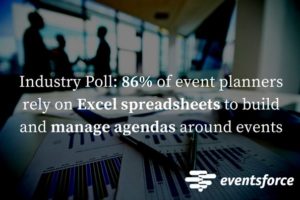How to Save Time Creating Agendas for Your Events
One of the most important jobs of an event planner is to identify the reasons why people want to attend an event and build an agenda around these needs. But creating and managing great event programmes is also one of the most frustrating and time-consuming things an event planner has to do. Speakers change. Topics change. Room capacities no longer meet demand. And the larger the event, the more complex these issues become.
 An industry poll from Eventsforce last month found that an overwhelming 86% of event planners rely on Excel spreadsheets to build and manage agendas around their events. Which makes sense if your agenda has a simple one-track format. But what happens when you’re dealing with a multi-track event? What if you have a three-day conference where attendees can pick and choose which sessions they want to attend? What if a last-minute change to your keynote impacts the timings of some of your other sessions?
An industry poll from Eventsforce last month found that an overwhelming 86% of event planners rely on Excel spreadsheets to build and manage agendas around their events. Which makes sense if your agenda has a simple one-track format. But what happens when you’re dealing with a multi-track event? What if you have a three-day conference where attendees can pick and choose which sessions they want to attend? What if a last-minute change to your keynote impacts the timings of some of your other sessions?
Excel is a fantastic planning tool for events – but in these situations, it does have its shortcomings. What organisers need instead is an intelligent programme management tool that can help them make changes to agendas quickly and easily, whilst ensuring that the information they’re dealing with (and sharing with attendees) is always kept accurate and up-to-date.
7 Ways Programme Management Tools Can Save Time Planning Events
Have a look at why a good programme management tool can do a better job than Excel when it comes to saving time in creating agendas and sessions around events:
1. Better Data Accuracy – Most programme management tools are integrated with the event’s registration system, which means any changes to the agenda can automatically be updated and published within registration forms, apps and event websites. This not only saves time in transferring data from spreadsheets and other systems, but it also makes sure that the information is accurate and up-to-date.
2. Improved Categorisation – Event planners can assign labels to sessions to identify the topic or stream each one belongs to (ex. presentations that focus on marketing only). This makes it a lot easier to track, manage and make changes to those sessions that belong in a particular category. It also helps personalise the attendee registration experience by making it easier for them to view, search and choose those sessions that are of interest to them.
3. Bulk Management – Instead of individually assigning capacity, rooms or labels to each session, organisers can save time by bulk assigning the same labels and rooms to their selected list. For example: Sessions 2, 3 and 5 can be allocated to conference room B with a click of a button.
4. Flexibility in Publishing Sessions – Event planners can choose which sessions they want to publish on registration forms, websites and apps and which they want to save in draft. This helps them make better use of time by opening registrations for some sessions, whilst confirming details such as speakers and presentation topics on others.
5. Identifying Room & Time Clashes – Programme management tools can automatically notify organisers of potential conflicts when the same room has been assigned to more than one session at the same time. Similarly, the system will stop attendees from double-booking, if any of their chosen sessions overlap. This not only brings a better registration experience, but also reduces the time spent by the events team dealing with scheduling enquiries from attendees.
6. Automatic Scheduling – Intelligent scheduling in a programme management tool can also be particularly useful for events that have a defined set of presentations within an allocated session. The organiser of a multi-stream medical conference, for example, may schedule a number of oral abstract presentations within a one-hour session, but needs to make changes to the timings of some of these presentations or swap some speakers around. He or she can simply drag and drop different presentations into the agenda and the system will automatically recalculate the new start and end times of each one, as well as notify users if the agenda is running overtime.
7. Real-Time Management Insight – Event planners can save time making important decisions around sessions and agendas through the real-time data insight a programme management tool can provide. For example, organisers can get an accurate overview on how each session is doing in terms of registrations and room capacity. If a session proves to be more popular than anticipated, it can prompt the organiser to swap rooms around or assign the session to a larger room.
The Eventsforce programme management tool helps event planners automate the entire process of creating, publishing and managing agendas for single or multi-track events. For more information, click here or call us for a chat on +44 (0) 207 785 6997.

